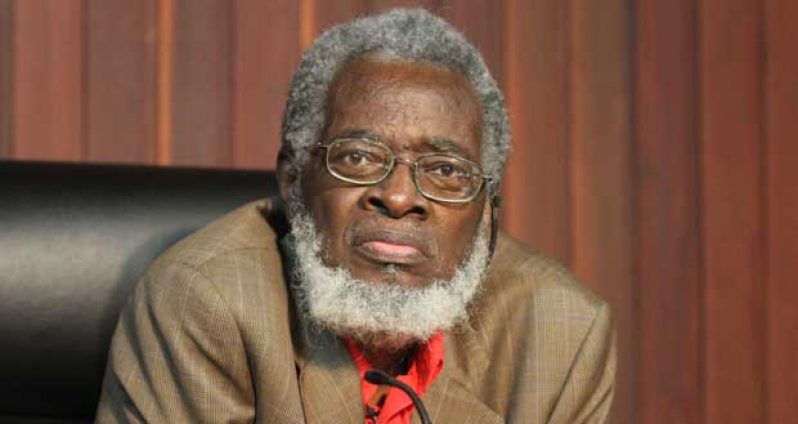Luncheon reports no progress from Ramotar/Granger discussions
NO PROGRESS has been made in the discussions between President Donald Ramotar and Opposition Leader David Granger, as far as the Caribbean Financial Action Task Force (CFATF)/Financial Action Task Force (FATF) compliant legislation is concerned.
This was reported yesterday by Cabinet Secretary Dr. Roger Luncheon, when he provided the update at his usual post press briefing at Office of the President, Shiv Chanderpaul Drive in Georgetown.
Furthermore, at the most recent Parliamentary Special Select Committee (PSSC), the Head of the Presidential Secretariat (HPS) reported: “You had more of the same interminable discussions, inflexibility and essentially, the same outcome, no movement. None whatsoever.
‘Blacklisting, apparently, cannot be turned on and off like piped water. Legislation is needed, but while necessary, it is not sufficient. Blacklisting is not needed. Blacklisting should be avoided at all costs. International experience has shown that, minimally, it takes two years to get out of this blacklisting trap. Very few have done it in less. Most have taken more than two years’ – Dr Luncheon
“We had harboured some expectation that FATF plenary is on the 19th and that there might have been some movement sufficient enough to have the enactment of the legislation. This is what we harboured. Now we know that that anticipation fades more and more into the realm of impossibility.
“This last PSSC meeting by no means contributed to us having any hope that this expectation would be realised,” Luncheon remarked.
Meanwhile, he said it goes without saying that some CFATF/FATF compliant anti-money laundering legislation is better than none.
Piped water
“Blacklisting, apparently, cannot be turned on and off like piped water. Legislation is needed, but while necessary, it is not sufficient. Blacklisting is not needed. Blacklisting should be avoided at all costs. International experience has shown that, minimally, it takes two years to get out of this blacklisting trap. Very few have done it in less. Most have taken more than two years.
“The results of what have essentially taken place up to now is that we have been blacklisted and the expectations that come the June plenary of FATF, the blacklisting would solidify and the discretion of jurisdictions state parties that are obliged to being members of the Treaty to protect their financial systems would see blacklisting of Guyana taken to a higher level than it currently is and has been.
“To the extent that the blacklisting and its extent is a function of those jurisdictions that are notified by CFATF and FATF that Guyana has defaulted and Guyana is blacklistable, it means then that our time to be spent in getting out of the blacklisting trap, our efforts would be dedicated to meeting and satisfying the requirements that are being adopted or imposed on CFATF and FATF treaty players.
“Essentially, when we get to the point of enacting CFATF or FATF compliant anti-money laundering legislation, let us not assume that we have done all that is necessary. As I pointed out, the legislation is necessary but it is not sufficient,” Luncheon reiterated.
At a previous press conference, he had said the Opposition continues to deny responsibility for this “sad state of affairs” and wants the public to believe that the anti-money laundering legislation is just another aspect of local politics.
“It is unfortunate that the Opposition attends in Parliament to the plight of the Berbice Bridge crossers, the maritime commuters and declines, refuses to see the bigger picture of FATF compliant legislation,” he lamented.
(By Telesha Ramnarine)





.jpg)








